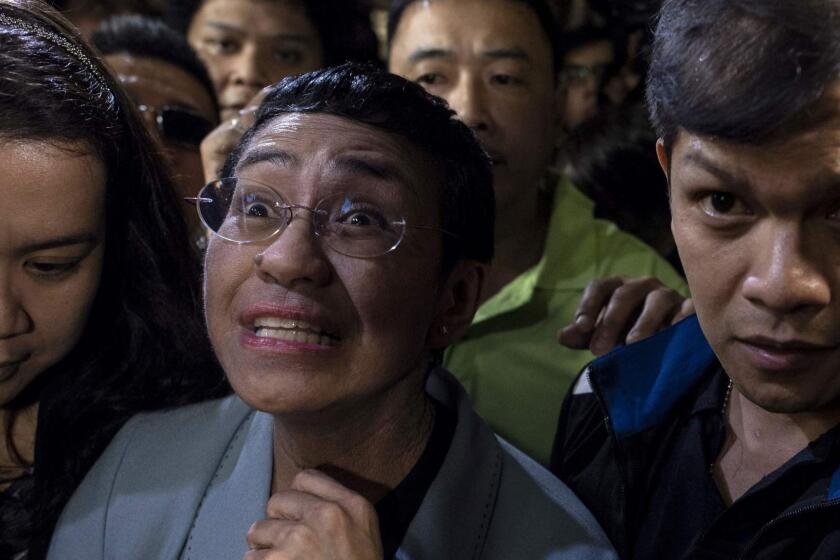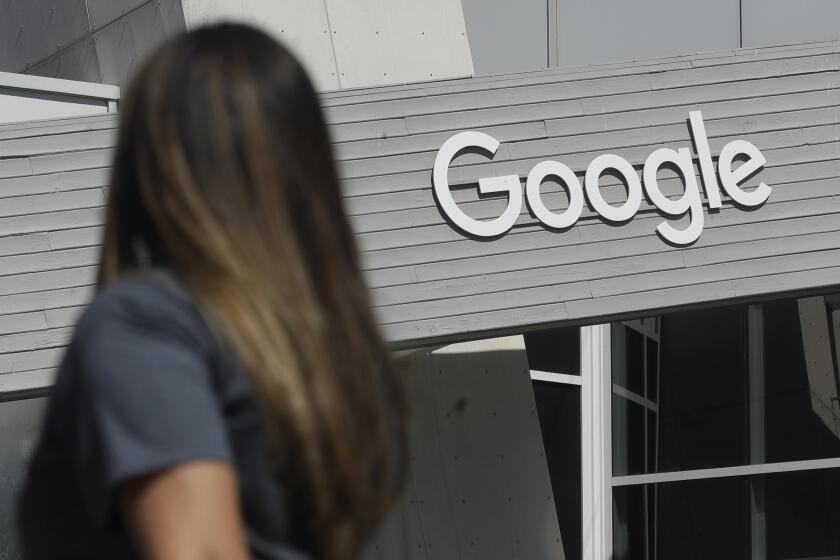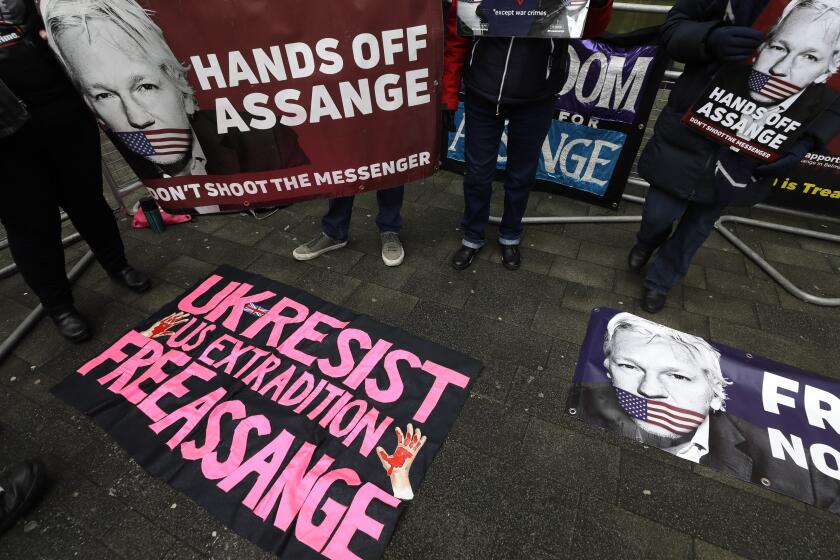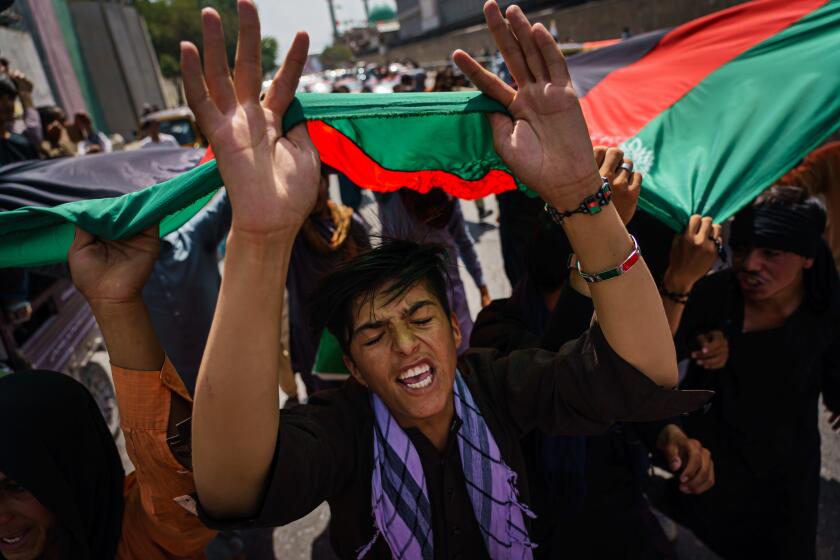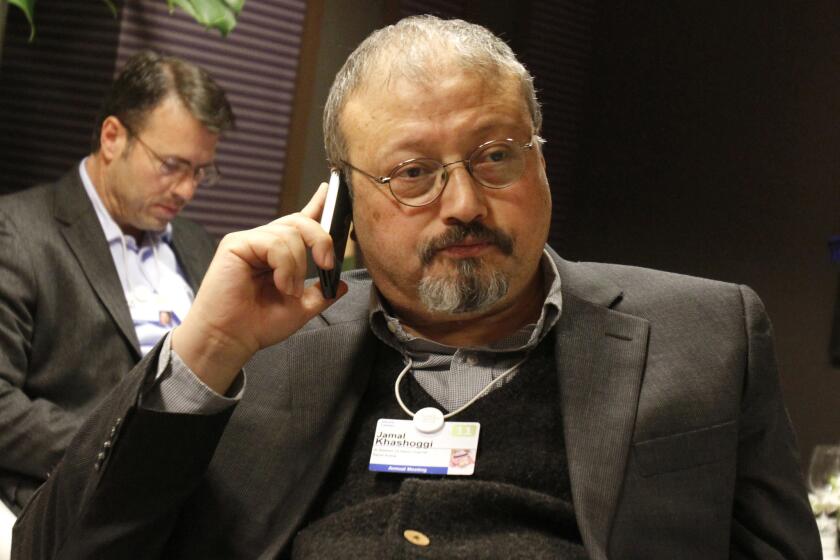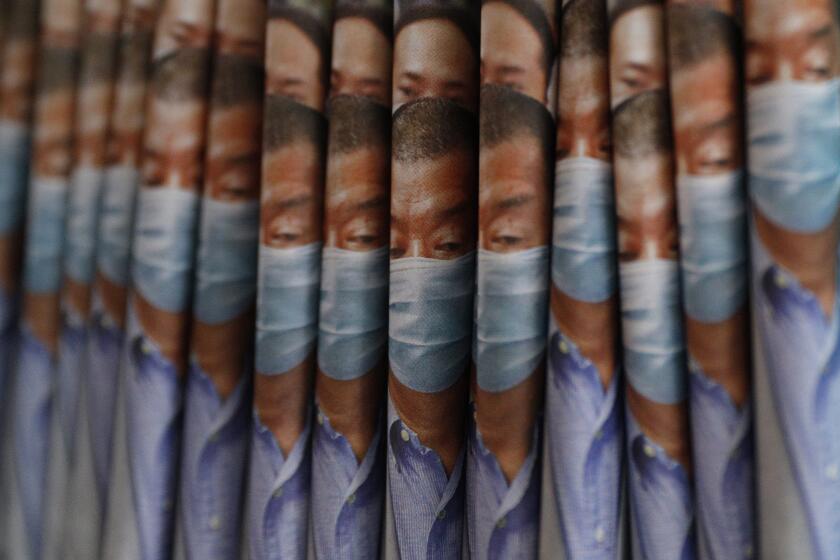Nobel Peace Prize is awarded to journalists Maria Ressa and Dmitry Muratov
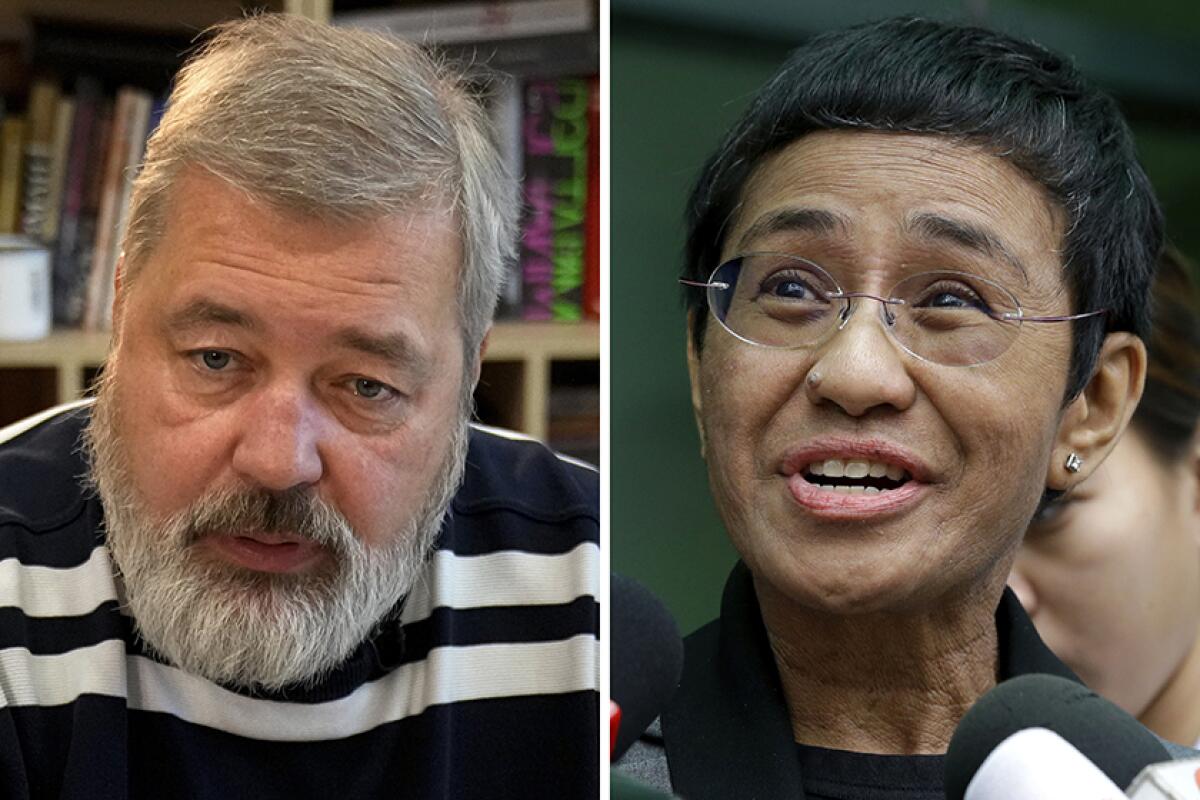
OSLO — Journalists Maria Ressa of the Philippines and Dmitry Muratov of Russia won the Nobel Peace Prize on Friday in recognition of “their efforts to safeguard freedom of expression” in countries where media outlets have faced persistent attacks, harassment and even murder.
The Norwegian Nobel Committee paid tribute to the two “for their courageous fight for freedom of expression in the Philippines and in Russia. At the same time, they are representatives of all journalists who stand up for this ideal in the world, in which democracy and freedom of the press face increasingly adverse conditions.”
Ressa, a Filipino American and former CNN reporter, “uses freedom of expression to expose abuse of power, use of violence and growing authoritarianism in her native country, the Philippines,” said Berit Reiss-Andersen, chair of the Norwegian Nobel Committee.
In 2012, Ressa co-founded Rappler, an investigative news website that has focused a spotlight on President Rodrigo Duterte’s harsh anti-drug crackdown, which has produced such a high body count that it “resembles a war waged against the country’s own population,” the committee said. Ressa and Rappler “have also documented how social media is being used to spread fake news, harass opponents and manipulate public discourse,” Berit Reiss-Andersen said.
Ressa, who said she felt “really emotional” at being awarded the Nobel, was convicted last year of libel and sentenced to jail in a decision seen as a major blow to global press freedom. She is also the first woman awarded a Nobel this year and the first Filipino to win the peace prize.
“This relentless campaign of harassment and intimidation against me and my fellow journalists in the Philippines is a stark example of a global trend,” she told the Associated Press, adding that she hopes the award bolsters investigative journalism “that will hold power to account.”
A day after posting bail, a defiant Maria Ressa sat in a car winding its way through Manila’s notoriously congested traffic to attend a rally in support of press freedom.
Muratov co-founded the independent Russian newspaper Novaya Gazeta in 1993 and became its editor in chief. Former Soviet leader Mikhail Gorbachev had used some of his prize money from winning the 1990 Nobel Peace Prize to help the outlet buy office equipment and computers.
“Novaya Gazeta is the most independent newspaper in Russia today, with a fundamentally critical attitude towards power,” Reiss-Andersen said, noting that six of its journalists have been killed, including Anna Politkovskaya, who covered Russia’s bloody conflict in Chechnya.
“The newspaper’s fact-based journalism and professional integrity have made it an important source of information on censurable aspects of Russian society rarely mentioned by other media,” Reiss-Andersen said.
Muratov said he would use his win to help independent journalists who have faced a growing pressure from the Russian authorities, including those who were officially declared “foreign agents” — a designation that carries pejorative connotations and implies additional government scrutiny.
Russia threatens to slow down Google services because of content the government dislikes. The tactic is already being used effectively against Twitter.
“We will use it to shore up Russian journalism that has faced repressions,” Muratov said in comments carried by a Russian messaging app channel. “We will try to help the people who have been designated as agents, have faced persecution and have been forced out of the country.”
According to the Committee to Protect Journalists, 17 media workers were killed in the Philippines in the last decade and 23 in Russia.
Recognizing Ressa and Muratov “is intended to underscore the importance of protecting and defending” freedom of expression, Reiss-Andersen said.
“The Norwegian Nobel Committee is convinced that freedom of expression and freedom of information help to ensure an informed public. These rights are crucial prerequisites for democracy and protect against war and conflict,” Reiss-Andersen said.
A 2019 indictment of WikiLeaks publisher Julian Assange was chilling to advocates of a free press and democracy. Why have they fallen silent?
In Russia, where the government of President Vladimir Putin has increasingly narrowed the space for independent media, Kremlin spokesman Dmitry Peskov congratulated Muratov on winning the prize, hailing him as a “talented and brave” person.
“We can congratulate Dmitry Muratov — he has consistently worked in accordance with his ideals, he has adhered to his ideals, he’s talented and brave. It’s a high appraisal and we congratulate him,” Peskov said in a conference call with reporters after the prize was announced.
Moscow-based political analyst Abbas Gallyamov said the award marked “a painful strike to the Russian authorities ... because the freedom of speech and the principles of independent journalism are an evil in the eyes of Russian authorities.”
Some critics questioned whether awarding the prize to Ressa and Muratov was in line with Swedish inventor Alfred Nobel’s will and the prize’s original purpose to prevent war. Dan Smith, director of the Stockholm International Peace Research Institute, was among those who said it was justified.
Taliban fighters rough up two journalists, then seek to make amends by offering water and a sports drink.
“Freedom of expression is a part of democracy, and democratic systems are proven to be more stable, less likely to go to war with each other, less likely to experience civil war,” Smith told the Associated Press.
Reiss-Andersen noted that the peace prize has gone to journalists in the past, including Ernesto Teodoro Moneta of Italy, who was cited in 1907 “for his work in the press and in peace meetings.”
In 1935, German journalist Carl von Ossietzky was awarded the prize “for his burning love for freedom of thought and expression” after revealing that the Nazi regime was secretly re-arming in breach of the World War I peace accord.
Ressa has been particularly critical also of the role of tech companies such as Facebook in manipulating public debate, and their failure to curb hate speech. Speaking on Rappler’s site after the award was announced, Ressa said that the “virus of lies that has been introduced through the algorithms of the social media platforms — it infects real people and changes.”
Journalists in the Arab world are finding that it’s becoming risky not just to criticize their own countries, but also their countries’ allies.
Media rights group Reporters Without Borders celebrated the prize announcement, expressing “joy and urgency” in reaction to the news.
“Joy because this is an extraordinary tribute to journalism, an excellent tribute to all journalists who take risks everywhere around the world to defend the right to information,” the group’s director, Christophe Deloire, said from its Paris headquarters. “And also urgency because it will be a decisive decade for journalism. Journalism is in danger, journalism is weakened, journalism is threatened. Democracies are weakened by disinformation, by rumors, by hate speech.”
The group has worked with Ressa and Muratov to defend journalism in their countries, and comes under regular criticism from authoritarian governments.
PEN America, which promotes freedom of expression, called the Nobel Prize timely because of the “unparalleled menace” journalists face in authoritarian societies.
Breaking News
Get breaking news, investigations, analysis and more signature journalism from the Los Angeles Times in your inbox.
You may occasionally receive promotional content from the Los Angeles Times.
After the announcement, the Nobel Committee was itself put on the spot by a reporter who asked about its decision to award the 2019 peace prize to Ethiopian Prime Minister Abiy Ahmed, who has since become entangled in a deadly domestic conflict with the powerful Tigray region in northern Ethiopia.
“Today I will not comment on other Nobel laureates and other issues than we have on the table today, but I can mention that the situation for freedom of press in Ethiopia is very far from ideal and is facing severe restrictions,” Reiss-Andersen said.
Last year’s peace prize went to the United Nations’ World Food Program, which was established in 1961 at the behest of then-President Eisenhower to fight hunger around the globe. The Rome-based agency was lauded for seeking to end starvation as “a weapon of war and conflict.”
Bookmakers had listed the World Health Organization as one of the favorites for this year’s award. Also mentioned as possible winners were the organization Reporters Without Borders, the Black Lives Matter movement, teenage climate activist Greta Thunberg, exiled Belarusian opposition leader Sviatlana Tsikhanouskaya and imprisoned Russian dissident Alexei Navalny.
The raid this week of Apple Daily’s newsroom and leadership changes at broadcaster iCable highlight the shrinking space for independent journalism as Beijing exerts more control over a once freewheeling Hong Kong.
The award is accompanied by a gold medal and 10 million Swedish kronor (more than $1.14 million). The prize money comes from a bequest left by inventor Nobel, who died in 1895.
On Monday, the Nobel Committee awarded the prize in medicine to California scientists David Julius and Ardem Patapoutian for their discoveries relating to how the body perceives temperature and touch.
The Nobel in physics was awarded Tuesday to three scientists whose work found order in seeming disorder, helping to explain and predict complex forces of nature, including climate change.
Benjamin List and David W.C. MacMillan were named as winners of the Nobel Prize in chemistry Wednesday for finding an easier and environmentally cleaner way to build molecules that can be used to make compounds, including medicines and pesticides.
The prize for literature was awarded Thursday to British-based Tanzanian writer Abdulrazak Gurnah, who was recognized for his “uncompromising and compassionate penetration of the effects of colonialism and the fate of the refugee.”
Still to come Monday is the prize for outstanding work in the field of economics.
More to Read
Sign up for Essential California
The most important California stories and recommendations in your inbox every morning.
You may occasionally receive promotional content from the Los Angeles Times.
